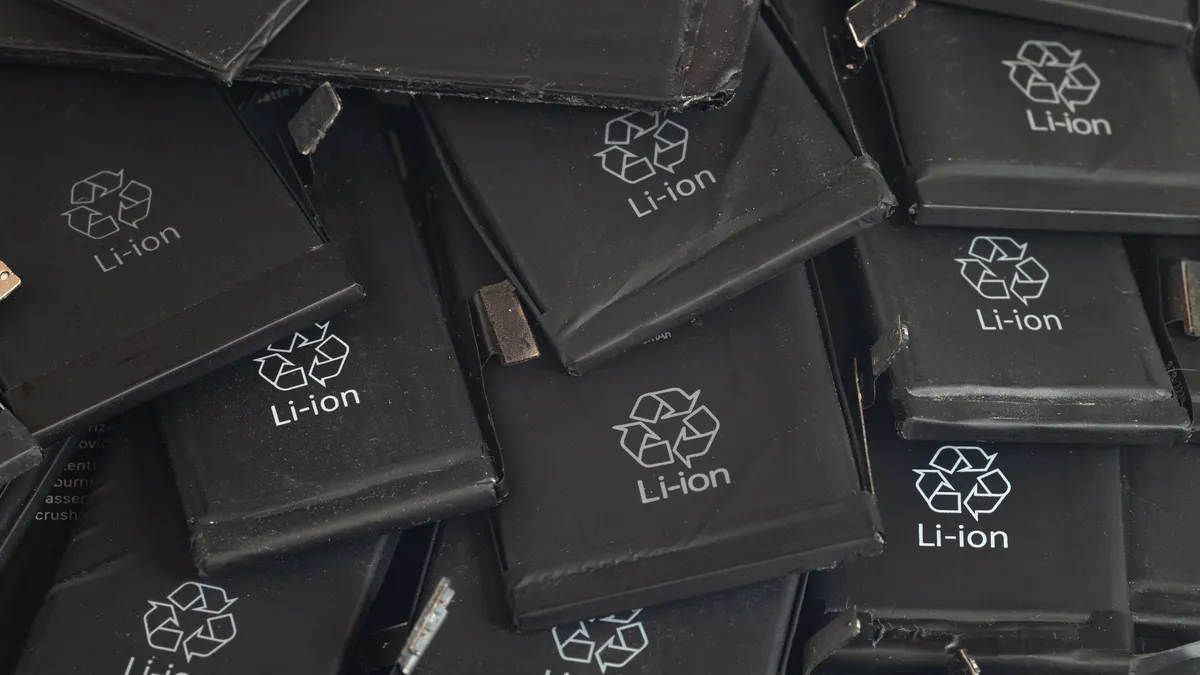Dive Brief:
- California’s legislature has passed two bills to update the state’s battery takeback programs to cover more products, improve the collection process and prevent such batteries from causing fires at waste and recycling facilities.
- AB 2440 establishes an extended producer responsibility program for most batteries as early as April 1, 2025. It would require producers to create a stewardship organization to handle collection, transportation and recycling and keep track of how many batteries are recycled.
- SB 1215 would add battery-embedded products to the state’s e-waste program, which currently collects items such as TVs and monitors. Starting in 2026, consumers of such products would pay a fee during purchase, meant to fund the item’s eventual end-of-life handling.
Dive Insight:
Both bills have passed and supporters expect them to end up on Gov. Gavin Newsom’s desk soon. Proponents have attempted to pass versions of these bills in recent years, but supporters say they gained better traction this year partly because of the rise in facility fires.
“Many Californians don't realize that all batteries are hazardous waste” and that throwing batteries in curbside bins can lead to “devastating” fires in collection vehicles and at waste and recycling facilities, said Assemblymember Jacqui Irwin, a sponsor of the bill, in a statement.
California already has a takeback program for some types of rechargeable batteries, but many consumers dropped off numerous other types of batteries because they were not sure which ones applied to the program, bill proponents said.
“AB 2440 makes sure that there's convenience for the consumers, that it's paid for by the manufacturers, and that the batteries are being recycled,” said Doug Kobold, executive director of the California Product Stewardship Council, a sponsor of the bill along with Rethink Waste and Californians Against Waste. Supporters also include Republic Services and numerous solid waste management districts.
The bill covers many kinds of batteries, including most rechargeables as well as loose household batteries and others. It also calls for more battery drop-off locations in each county and would require some retailers to have permanent collection sites. The state plans to continue using existing retail collection and recycling infrastructure, according to a bill analysis.
Groups such as the Consumer Technology Association and California Retailers Association said they generally support battery takeback programs, but said most members were already participating in Call2Recycle's recycling drop-off program for rechargeable batteries and adding more kinds of batteries could be burdensome.
AB 2440 originally proposed including battery-embedded products in the EPR program, but it was amended in the Assembly to remove them. Battery-embedded products would now be captured under the state's electronic waste program in a separate bill, SB 1215.
SB 1215 would add many battery-embedded products — meaning products with batteries not designed to be removed by the consumer — to the state’s existing electronic waste recycling program. The bill has not received formal opposition and exempts some products like prescribed medical devices. It is sponsored by state Sen. Josh Newman and supported by most of the same entities as AB 2440.
Manufacturers of such products will need to submit reports to CalRecycle starting in July 2027 with how many covered electronic devices they sold in the state and the estimated amount of recycled materials in such products.
Funneling all kinds of batteries into specific takeback programs helps protect curbside collection workers and those who work in MRFs or waste facilities, Kobold said.
California has seen a rise in such fires over the years, with one facility in San Carlos experiencing at least 10 fires almost every year since 2017 and a MRF in Richmond experiencing six fires between 2020 and 2021, according to a bill analysis. Such fires can also impact solid waste facility operators’ ability to find insurance, the analysis said. Batteries from cell phones, a drone, a lawnmower and a Prius likely contributed to the recent fires, it said.
Supporters also expect to pass a separate bill to ban single-use, one-pound propane cylinders, which are another source of fires and explosions at waste facilities and can harm people who attempt to refill them, Kobold said. That bill is on Gov. Newsom’s desk awaiting signature.
Editor’s note: This story has been updated to reflect that the state legislature has passed both bills.











